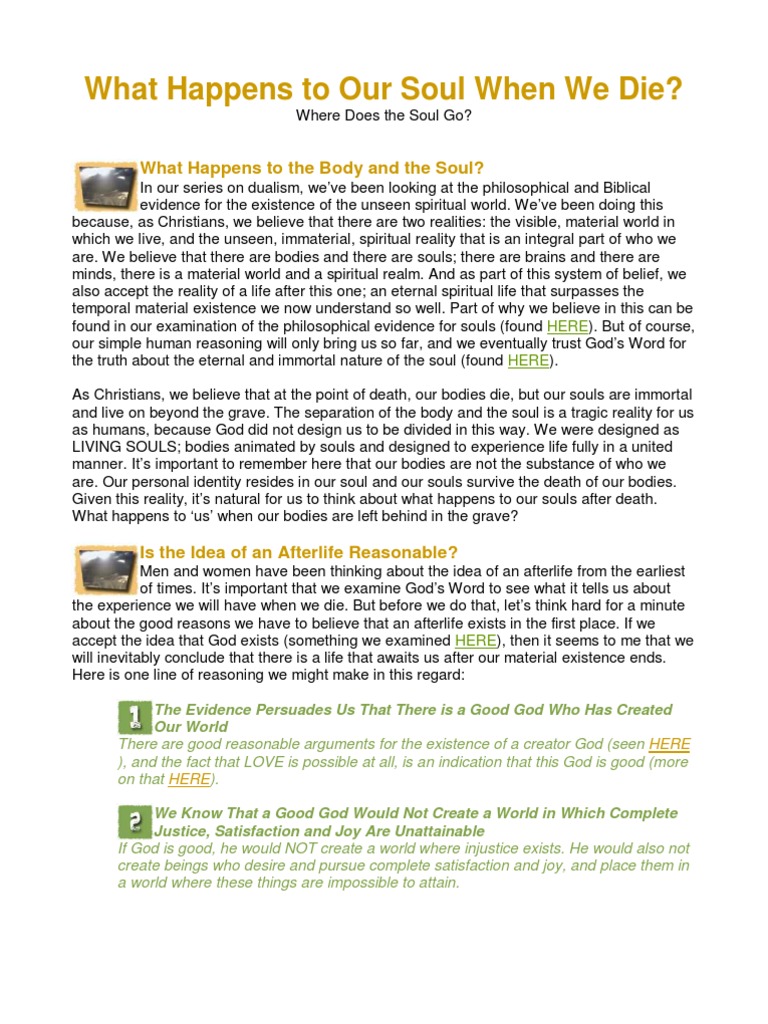The inquiry into the fate of the soul after death has occupied the minds and hearts of humanity for millennia. Within the Baha’i Faith, a world religion emerging in the 19th century, the teachings surrounding the afterlife are imbued with clarity, optimism, and profound spiritual significance. This reflection aims to elucidate Baha’i perspectives on what becomes of the soul post-mortem, encouraging a transformative understanding of life, death, and the eternal journey of the soul.
At the core of Baha’i belief is the tenet that the soul is immortal. This premise signifies a radical shift in perspective; death is not an end but rather a transition to another realm of existence. Baha’i teachings posit that the soul continues to live on, perpetuating its journey through various stages of existence. This conception infuses the temporal life with purpose, urging adherents to cultivate their souls and strive for spiritual growth whilst alive.
Baha’u’llah, the founder of the Baha’i Faith, elucidates that the soul, upon departing from the physical body, ascends to the spiritual world. This ascent is contingent not upon arbitrary divine judgment but rather on the virtues and qualities nurtured during one’s earthly existence. In essence, the soul’s progression through the afterlife is akin to a reflection of the individual’s life experiences, actions, and spiritual accomplishments. Thus, the manner in which one lives can significantly influence the trajectory of their soul in the hereafter.
In Baha’i philosophy, the concept of the afterlife diverges from simplistic notions of heaven and hell. The Baha’i perspective posits a more nuanced view, embracing the idea of the spiritual realms as stages of development rather than fixed destinations. These realms represent varying degrees of proximity to the divine, achieved through the cultivation of spiritual qualities. Consequently, the soul’s journey is characterized by continuous learning and growth, unfurling the potential that lies within each individual.
Furthermore, the significance of earthly life in shaping the soul cannot be overstated. Each moment on this plane is an opportunity to engage in acts of kindness, justice, and humility—attributes that Baha’is believe contribute to the soul’s vibrant hue in the afterlife. The teachings emphasize that the true measure of a person’s worth is not material success but rather the alignment of one’s actions with divine principles. In this light, transient life experiences take on profound meaning, driving individuals to lead purposeful lives that resonate with their spiritual values.
Moreover, Baha’i thought introduces the concept of the “World of the Spirit.” Baha’is believe that upon death, the soul enters this spiritual dimension, where it experiences the consequences of its earthly choices and encounters the divine. This realm is often described in evocative metaphors; it is a space filled with light, love, and the presence of God. The immersion of the soul in such a world is not only a comforting proposition but also serves as a motivational force, compelling individuals to pursue a life steeped in virtue and goodness.
Importantly, the teachings also offer reassurance regarding the continuity of human relationships. Baha’is hold that bonds formed in this life transcend physical death, allowing souls to remain connected even as they transition into the spiritual realms. This belief engenders a sense of solace, reinforcing the idea that love and companionship are fundamental components of human existence, transcending the confines of mortality. The interconnectedness of souls is a pivotal aspect of the Baha’i Faith—a reminder that the divine plan encompasses not just individual journeys but the collective progression of humanity.
In light of these profound insights, the Baha’i approach encourages a reevaluation of one’s life narrative. Rather than approaching death as an endpoint, it invites a view of life as a precious opportunity to evolve spiritually and contribute to the greater good. This reframing instills hope and inspires individuals to rise above fears of mortality, recognizing that the soul’s true essence is its spiritual journey, rather than its temporary earthly existence.
The promise of an eternal journey underscores the necessity of engaging in self-reflection and introspection. By contemplating the attributes and virtues one wishes to cultivate, individuals can actively shape the state of their souls. The Baha’i teachings advocate for a deliberate and mindful way of living that fosters growth and understanding, thus magnifying the potential of the soul within both this life and the next.
Ultimately, the Baha’i Faith offers a profound lens through which to consider the fate of the soul after death. The teachings reveal a rich tapestry of spiritual continuity and growth, inviting individuals to pursue a life of purpose, connection, and virtue. The emphasis on the immortality of the soul liberates believers from the shackles of despair, replacing fear with a clarion call to elevate the human spirit. In this light, the journey toward the divine begins in earnest, marking each life as but a stepping stone toward the sublime realms beyond.
